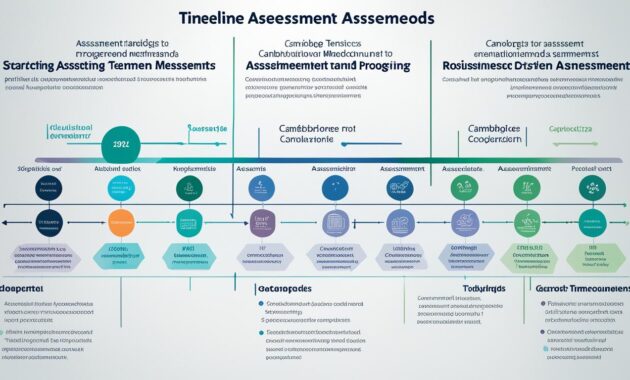Role Of Exams In Education, serving as a benchmark for assessing knowledge, skills, and understanding. From ancient civilizations to the modern era, exams have evolved and continue to be a significant factor in student development, academic success, and personal growth.
As students prepare for examinations, they engage in comprehensive learning, gaining a deeper understanding of the subject matter. Exams provide a structured framework that motivates students to study and absorb information, ensuring their academic progress and overall success. Through examinations, students learn to manage their time effectively, prioritize tasks, and take responsibility for their own learning.
Key Takeaways:
- Exams are essential for assessing knowledge, skills, and understanding in education.
- They motivate students to study and achieve academic success.
- Exams aid in the development of crucial skills such as time management and responsibility.
- They contribute to personal growth and overall student development.
- Examinations are a significant factor in determining academic progress and success.
Origins of Examinations: From Ancient China to Medieval Europe
Examinations have their roots in ancient civilizations, spanning from ancient China to medieval Europe. These early assessment methods laid the foundation for the standardized testing we have today.
“The roots of education are bitter, but the fruit is sweet.” – Aristotle
Ancient China: Imperial Examinations
In ancient China, the Han Dynasty introduced imperial examinations as a means to select qualified candidates for civil service positions. These exams, known as Keju, were rigorous and covered a wide range of subjects, including literature, history, and philosophy. The imperial examinations played a significant role in shaping the bureaucracy and promoting social mobility within Chinese society.
Ancient Greece: The Socratic Method
In ancient Greece, education revolved around the teachings of philosophers like Socrates. The Socratic method, named after Socrates himself, focused on questioning and critical thinking as a means of evaluating students’ knowledge and understanding. This interactive and thought-provoking approach to education laid the groundwork for modern educational techniques.
Medieval Europe: Formalized Assessments
In medieval Europe, as universities began to emerge, formalized assessments became essential to evaluate students’ comprehension and progress. These assessments varied in format and included both written and oral examinations. They played a crucial role in determining students’ academic success and paved the way for further advancements in educational evaluation.
The evolution of examinations from ancient civilizations to medieval Europe established a standardized approach to assessing knowledge and understanding. These historical practices serve as a reminder of the enduring importance of examinations in education.
| Ancient China | Ancient Greece | Medieval Europe |
|---|---|---|
| Introduction of imperial examinations | Development of the Socratic method | Formalized assessments in universities |
| Evaluation for civil service positions | Questioning and critical thinking | Evaluating students’ comprehension |
| Selecting qualified candidates | Interactive and thought-provoking | Determining academic success |
Henry A. Fischel: The Inventor of Examinations?
While Henry A. Fischel, a professor at Indiana University, is often attributed to inventing exams, some controversy and uncertainty surround this claim. Standardized testing, a method commonly used in examinations, comes with its own set of limitations that should be taken into consideration when evaluating the role of exams in education.
Standardized testing, a product of Fischel’s work, aims to provide a fair comparison of knowledge and aptitude among students. However, it is important to note that cultural context and biases can significantly impact the fairness of exam outcomes.
When considering the influence of cultural context in exams, it becomes apparent that individuals from different backgrounds may face unique challenges that affect their performance. Cultural biases embedded within exam questions can inadvertently disadvantage certain groups, leading to inequitable evaluation.
Furthermore, the limitations of exams extend beyond cultural factors. Exams often favor rote memorization and regurgitation of information, disregarding critical thinking and practical application. This narrow focus can undermine the development of essential skills required in real-world scenarios.
To fully comprehend the impact of exams, it is crucial to acknowledge the limitations associated with standardized testing, cultural context, biases, and the narrow scope of evaluation. By doing so, educators and policymakers can strive to create a more inclusive and robust assessment system that better reflects the diverse talents and abilities of students.
The Purpose and Benefits of Exams
Exams serve multiple purposes in education. They play a vital role in assessing a student’s understanding of a subject, allowing educators to evaluate their knowledge and comprehension. This evaluation provides valuable feedback on academic progress, highlighting areas of strength and areas that require improvement. By identifying these areas, exams enable both students and teachers to focus their efforts and optimize learning outcomes.
One of the key benefits of exams is the development of essential skills such as time management and responsibility. Due to the structured nature of exam preparation, students learn the value of organizing their time effectively and prioritizing tasks. This skill is transferable to many aspects of life, helping individuals balance their commitments and meet deadlines.
Moreover, exams serve as a powerful motivator for students. The opportunity to demonstrate their knowledge and perform well in exams can inspire students to work harder and strive for academic excellence. This motivation can drive students to put in extra effort, engage in self-directed learning, and achieve their educational goals.
Exams also open doors to various opportunities, such as scholarships and academic recognition. Outstanding exam results can lead to scholarships, grants, and other forms of financial assistance, easing the financial burden of education and providing students with increased access to higher education and future opportunities.
While exams may evoke stress and anxiety in students, it is important to acknowledge the associated benefits. The purpose of exams extends beyond mere assessment, encompassing personal growth, skill development, and the unlocking of opportunities. With proper guidance and support, exams can be a stepping stone towards academic success and a fulfilling future.

Key Benefits of Exams:
- Assessment of understanding and knowledge
- Feedback on academic progress
- Development of time management skills
- Cultivation of a sense of responsibility
- Motivation for academic excellence
- Opportunities for scholarships and recognition
Limitations of Current Assessment Systems
While exams have long been a staple in educational assessment, it is important to recognize the limitations of current assessment systems. These limitations stem from a one-size-fits-all approach, a lack of real-world application, biases, and a limited scope for assessing multiple intelligences.
“Our educational system is built on the assumption that there is one right way to learn and be assessed. This approach fails to recognize the diverse learning styles and interests of students, leading to a narrow evaluation of their abilities.” – Dr. Jane Lewis, Professor of Education at Harvard University
One of the major limitations of current assessment systems is the one-size-fits-all approach. Exams tend to prioritize a standardized evaluation, neglecting the unique learning styles and interests of individual students. This can result in a disconnect between assessment outcomes and the real-world application of knowledge and skills.
The focus on theoretical knowledge in exams often fails to address the practical skills required for success in the professional world. This lack of emphasis on real-world application limits the applicability of exam results and fails to fully prepare students for future challenges.
Another significant challenge faced by current assessment systems is the presence of biases. Exams may inadvertently favor certain groups or exclude others based on cultural, socio-economic, or gender biases. These biases can undermine the fairness and accuracy of assessment outcomes, impacting students’ opportunities and experiences.
Furthermore, current assessment systems often have a limited scope for evaluating multiple intelligences. Intelligence encompasses a wide range of abilities beyond traditional academic measures. By primarily focusing on academic performance, exams may fail to identify and nurture other forms of intelligence, such as creativity, emotional intelligence, or practical skills.
To address these limitations, educators and policymakers are exploring innovative approaches to assessment. These alternatives aim to create a more inclusive and comprehensive evaluation of student abilities, incorporating real-world application and multiple forms of intelligence.
Examples of Alternative Assessment Methods
1. Project-based assessments: Instead of traditional exams, students are given the opportunity to showcase their understanding through hands-on projects, simulations, or extended research projects, allowing for a more holistic evaluation of their skills and abilities.
2. Holistic assessments: Holistic assessment methods consider multiple dimensions of a student’s capabilities, including academic performance, social skills, creativity, and problem-solving abilities. This approach takes into account different intelligences and provides a more comprehensive view of a student’s potential.
3. Performance assessments: These assessments evaluate a student’s competence by observing their practical skills and abilities in real-world scenarios. For example, in subjects like music or physical education, students may be assessed through live performances or demonstrations.
4. Online assessments: With the advancement of technology, online assessments provide an opportunity for more personalized evaluations. These assessments can adapt to individual learning styles and pace, providing a more tailored and relevant assessment experience.
As education continues to evolve, it is crucial to address the limitations of current assessment systems. By adopting more inclusive and comprehensive assessment methods, we can ensure a fair and accurate evaluation of students’ abilities and provide them with the necessary skills to thrive in the real world.

| Limitations of Current Assessment Systems | Solutions and Innovations |
|---|---|
| One-size-fits-all approach | Alternative assessment methods that consider diverse learning styles and interests |
| Lack of real-world application | Integration of practical skills and hands-on assessments |
| Biases | Evaluation of assessment tools for potential biases and implementation of measures to reduce bias |
| Limited scope for assessing multiple intelligences | Inclusion of various forms of intelligence in assessment criteria |
Evolution of Assessment Methods: From Standardized Testing to Cambridge Assessments
The field of assessment has witnessed significant evolution over time, adapting to the changing needs and demands of education. From the emergence of standardized testing to the introduction of Cambridge assessments, the evaluation of students’ knowledge and skills has come a long way.
Standardized testing gained popularity in the 19th and 20th centuries as a means to provide a standardized measure of knowledge and aptitude. These tests helped to establish a common benchmark for evaluating students’ abilities on a wide scale. However, they have also faced criticism for their one-size-fits-all approach, neglecting the diverse learning styles and individual talents of students.
Amidst the concerns raised by the limitations of standardized testing, Cambridge assessments emerged as an alternative method of evaluating student capabilities. Born in the 19th century, the assessments developed by the University of Cambridge focused on assessing students’ understanding and application of knowledge in various subjects. These assessments have evolved over time to encompass a range of methodologies, including multiple-choice exams, to provide a comprehensive evaluation of students’ abilities.
The evolution of assessment methods has been driven by the need for a more holistic evaluation that goes beyond rote memorization and theoretical knowledge. Cambridge assessments, with their emphasis on real-world application, aim to bridge the gap between academic learning and practical skills.
To illustrate the transition from standardized testing to Cambridge assessments, let’s take a closer look at the key differences and their impact:
Standardized Testing
In standardized testing, students are evaluated based on a predetermined set of questions and criteria. These tests are typically multiple-choice exams administered to a large number of students simultaneously. While standardized testing provides a standardized measure of knowledge, it often fails to assess students’ ability to apply their knowledge in real-world scenarios.
Cambridge Assessments
Cambridge assessments, on the other hand, take a more comprehensive approach to evaluating students’ capabilities. They incorporate a range of assessment methods, including multiple-choice exams, written examinations, coursework, and practical assessments, depending on the subject and level of study. This allows for a more diverse evaluation of students’ skills, fostering critical thinking, analytical reasoning, and real-world application.
Moreover, Cambridge assessments focus on nurturing the holistic development of students by encouraging them to think critically, engage in research, and apply their knowledge to solve complex problems. These assessments aim to prepare students for the challenges they may encounter in their academic and professional lives, instilling in them the skills and aptitudes needed for success.
A Comparative Overview
| Standardized Testing | Cambridge Assessments |
|---|---|
| One-size-fits-all approach | Comprehensive evaluation considering diverse talents and abilities |
| Focuses on theoretical knowledge | Emphasizes real-world application and practical skills |
| Limited scope in assessing multiple intelligences | Fosters critical thinking, analytical reasoning, and research skills |
As education strives to meet the demands of a rapidly changing world, assessments play a crucial role in shaping pedagogical approaches. The evolution from standardized testing to Cambridge assessments represents a shift towards a more comprehensive and inclusive evaluation of students’ abilities, equipping them with the skills necessary for success in the real world.

With a focus on real-world application and consideration of diverse talents, Cambridge assessments have become an influential force in the field of education. However, the journey of assessment methods is far from over. Section 7 will explore case studies that highlight the limitations of current assessment systems and innovative approaches to address these challenges.
Case Studies: Limitations and Innovations in Assessment
Several case studies shed light on the limitations of current assessment systems and the innovative approaches being developed to overcome these challenges. Traditional standardized tests have long been criticized for their one-size-fits-all approach, which fails to account for the diverse strengths and intelligences of individual learners. In response to these limitations, educators and researchers have been exploring alternative assessment methods that offer a more holistic and personalized evaluation of students’ abilities.
Case Study 1: Holistic Assessment
A case study conducted at Stanford University examined the efficacy of holistic assessment in evaluating students’ comprehension and critical thinking skills. Holistic assessment involves evaluating a student’s performance based on a range of criteria, including project-based assignments, presentations, and portfolios. The study revealed that holistic assessment provides a more comprehensive understanding of a student’s abilities and allows for a more authentic demonstration of knowledge and skills in real-world contexts.
Case Study 2: Personalized Evaluations
At the University of California, researchers conducted a case study exploring the effectiveness of personalized evaluations in assessing student progress. This approach involves tailoring assessments to individual strengths and interests. By allowing students to choose assessment formats that align with their learning styles, such as essays, multimedia presentations, or hands-on projects, personalized evaluations foster engagement and provide a more accurate representation of students’ knowledge and skills.
Case Study 3: Alternative Assessment Methods
In a collaborative study between Harvard University and MIT, researchers investigated the benefits of alternative assessment methods, such as online exams and interactive simulations. These methods leverage technology to create engaging and interactive assessments that simulate real-world scenarios. The study found that alternative assessment methods not only offer a more authentic evaluation of students’ abilities but also promote digital literacy and problem-solving skills necessary for success in the 21st century.
Overall, these case studies highlight the need for a shift away from standardized tests and towards more inclusive and innovative assessment methods. By considering the unique strengths and talents of each student, holistic assessment, personalized evaluations, and alternative assessment methods offer a more accurate and comprehensive understanding of students’ abilities, paving the way for a more equitable and effective educational system.
The Future of Exams: Towards Inclusive and Comprehensive Assessment
The future of exams holds great potential for transforming education through the adoption of inclusive and comprehensive assessment methods. By recognizing and evaluating diverse talents and abilities, these methods can provide a more accurate representation of individuals’ capabilities. The goal is to achieve equity in education by ensuring that assessments are fair, unbiased, and capable of capturing the full range of human potential.
Inclusive assessment methods break away from the traditional one-size-fits-all approach, which often overlooks the unique learning styles and interests of students. Instead, they embrace a broader view of intelligence and talent, acknowledging that individuals excel in different areas and possess varied strengths. This inclusive approach allows for a more holistic evaluation of students’ abilities, fostering a greater sense of belonging and personal growth.
Comprehensive evaluation goes beyond mere theoretical knowledge and delves into the real-world application of skills and understanding. Assessments that incorporate practical elements, such as project-based assignments and problem-solving tasks, provide students with opportunities to showcase their abilities in authentic contexts. This type of evaluation not only measures academic progress but also prepares students for the challenges they may encounter in their future careers.
“By embracing inclusive and comprehensive assessment methods, we can unlock the diverse talents and potential that exist within every student, leading to greater educational equity and empowerment.”
The future of exams also involves addressing the biases inherent in current assessment systems. It is crucial to develop evaluations that are unbiased and prioritize objective criteria, ensuring that students from all backgrounds have an equal opportunity to succeed. By eliminating systemic biases, we create a more equitable education system that celebrates diversity and promotes equal access to quality education for all.
In order to visualize the future of exams, consider the following table that highlights the key differences between traditional exams and inclusive, comprehensive assessments:
| Traditional Exams | Inclusive, Comprehensive Assessments |
|---|---|
| Focus on theoretical knowledge | Emphasize real-world application |
| Prioritize memorization | Encourage critical thinking and problem-solving |
| Standardized format | Personalized evaluations tailored to individual strengths |
| One-size-fits-all approach | Recognize and celebrate diverse talents and abilities |
| Can be exclusive and biased | Ensure fairness and equity through unbiased evaluations |
By embracing the future of exams with inclusive and comprehensive assessment methods, we open doors to a more equitable and empowering education system. These methods not only recognize and evaluate diverse talents but also prepare students for the complexities of the real world. Through this evolution, we can create a future where every student has the opportunity to thrive and contribute to society.

Also Read:- Top Study Apps For Exams To Boost Your Grades
Conclusion
Exams play a crucial role in education by assessing students’ knowledge, skills, and understanding. They provide a standardized measure of academic progress and serve as a benchmark for evaluating student development. However, exams have their limitations that need to be addressed to ensure inclusive and comprehensive assessment.
One key limitation of exams is the one-size-fits-all approach, which overlooks the diverse learning styles and interests of students. This can result in an unfair evaluation of students’ capabilities. Additionally, exams often focus on theoretical knowledge rather than real-world application, leading to a gap between assessment outcomes and the practical skills required in professional settings.
Furthermore, exams may carry biases that can influence the fairness of the evaluation process. The limited scope of multiple intelligences in exams fails to recognize and assess the diverse talents and abilities of students. To overcome these limitations, the future of exams lies in the development of inclusive assessment methods that recognize and evaluate individual differences.
By addressing these challenges, the future of exams can contribute to a more equitable and accurate evaluation of students’ abilities and potential. It is crucial to embrace comprehensive assessment methods that consider the diverse talents, learning styles, and real-world application. This will create a more inclusive educational system that supports the holistic development of students and fosters equity in education.
FAQs
-
Q: What is the importance of exams in education?
A: Exams play a crucial role in education by helping students to develop a sense of discipline, identifying areas where they need improvement, and assessing their understanding of the material taught in class.
Q: How do exams help students in their academic journey?
A: Exams help students to prepare for tests and develop critical thinking and problem-solving skills. They also create a sense of achievement when students perform well.
Q: How do exams benefit teachers in the education system?
A: Exams help teachers to evaluate their teaching methods, understand how well students have grasped the concepts taught, and identify areas that need more focus in the curriculum.
Q: Why is the examination system focused on test-driven education?
A: The examination system emphasizes test-driven education to ensure that students are tested on their knowledge and understanding, preparing them for future challenges and opportunities.
Q: How do exams contribute to the development of critical thinking in students?
A: Exams test a student’s ability to think critically, analyze information, and solve problems effectively, enhancing their cognitive skills and ability to think analytically.
Q: How can exams create stress and anxiety among students?
A: Exams can be stressful for students due to the pressure to perform well, fear of failure, and the competitive nature of exams, leading to increased levels of anxiety and stress.
Q: Are exams necessary in the education system?
A: Exams are an essential part of the education system as they provide a standardized way to assess students’ knowledge, skills, and progress, ensuring a fair and objective evaluation process.
Source Links
- https://www.linkedin.com/pulse/unveiling-limitations-current-assessment-evaluation-systems-shukla
- https://myassignmenthelp.com/blog/who-invented-exams/
- https://www.kidspreneurship.com/who-invented-exams/